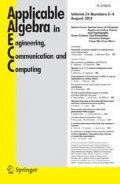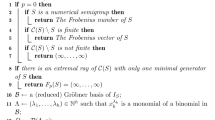Abstract
We consider Noetherian operators in the context of symbolic computation. Upon utilizing the theory of holonomic \({\mathcal D}\)-modules, we present a new method for computing Noetherian operators associated to a zero-dimensional ideal. An effective algorithm that consists mainly of linear algebra techniques is proposed for computing them. Moreover, as applications, new computation methods of polynomial ideals are discussed by utilizing the Noetherian operators.




Similar content being viewed by others
Change history
30 August 2022
A Correction to this paper has been published: https://doi.org/10.1007/s00200-022-00579-y
Notes
Currently, the Risa/Asir implementation is in the following URL
References
Abbott, J., Bigatti, A., Kreuzer, M., Robbiano, L.: Computing ideals of points. J. Symb. Comput. 30, 341–356 (2000)
Alonso, M.E., Mora, T., Raimondo, M.: Local decomposition algorithms Proc. AAECC 8, Lecture Notes in Computer Science, 508, 208–221, Springer (1991)
Alonso, M.E., Marinari, M.G., Mora, M.T.: The big Mother of all the dualities, II: Macaulay bases. Appl. Algebra Eng. Commun. Comput. 17, 409–451 (2006)
Aoyama, T., Noro, M.: Modular algorithms for computing minimal associated primes and radicals of polynomial ideals. Proc. ISSAC 2018, 31–38 (2018)
Becker, T., Weispfenning, V.: Gröbner Bases, Graduate Texts in Math. 141. Springer-Verlag (1993)
Brumfiel, G.: Differential operators and primary ideals. J. Algebra 51, 375–398 (1978)
Caboara M., Conte, P., Traverso C.: Yet another ideal decomposition algorithm, Lecture Notes in Computer Science, 1255, 39–54, Springer (1995)
Chen, J., Härkönen, M., Krone, R., Leykin, A.: Noetherian operators and primary decomposition. J. Symb. Comput. 110, 1–23 (2022)
Chen, J., Cid-Ruiz, Y., Härkönen, M., Krone, R., Leykin, A.: Noetherian operators in MACAULAY2. arXiv:2101.01002 (2021)
Cid-Ruiz, Y.: Noetherian operators, primary submodules and symbolic powers. Collect. Math. 72, 175–202 (2021)
Cid-Ruiz, Y., Homs, R., Sturmfels, B.: Primary ideals and their differential equations. Found. Comput. Math. 21, 1363–1399 (2021)
Damiano, A., Sabadini, I., Struppa, C, D.: Computational methods for the construction of a class of Noetherian operators. Exp. Math., 16, 41–53 (2007)
Decker, W., Greuel, G.-M., Pfister, G.: Primary decomposition: algorithms and comparisons. Algorithmic algebra and number theory (Heidelberg, 1997), 187–220, Springer (1999)
Eisenbud, D., Huneke, C., Vasconcelos, W.: Direct methods for primary decomposition. Invent. Math. 110, 207–235 (1992)
Ehrenpreis, L.: A Fundamental Principle for System of Linear Differential Equations with Constant Coefficients and Some of its Applications, pp. 161–174. Proc. Inter. Symp. on Linear Spaces, Jerusalem (1961)
Ehrenpreis, L.: Fourier Analysis in Several Complex Variables. Wily-Interscience Publishers, Hoboken (1970)
Faugère, K., Gianni, P., Lazard, D., Mora, T.: Efficient computation of zero-dimensional Gröbner bases by change of ordering. J. Symb. Comput. 16, 329–344 (1993)
Gianni, P., Trager, B., Zacharias, G.: Gröbner bases and primary decomposition of polynomial ideals. J. Symb. Comput. 6, 146–167 (1988)
Grayson, D. R., Stillman, M. E.: Macaulay2: a software system for research in algebraic geometry. Available at http://www.math.uiuc.edu/Macaulay2
Gröbner, W.: Uber das Macaulaysche inverse System und dessen Bedeutung für die Theorie der linearen Differentialgleichungen mit konstanten Koeffizienten. Abhandlungen aus dem Mathematischen Seminaren der Universität Hamburg, 12, 127–137 (1937) (English version: On the Macaulay inverse system and its importance for the theory of linear differential equations with constant coefficients. ACM Communications in Computer Algebra, 44, 20–23 (2010))
Gröbner, W.: Uber eine neue idealtheoretische Grundlegung der von linearen Differentiallgleichungen mit konstanten Koeffizienten. Monatshefte fur Mathematik und Physik, 47, 247–284 (1938)
Gröbner, W.: Algebraische Geometrie II. Hochschultaschenbücger (1970)
Hörmander, L.: An Introduction to Complex Analysis in Several Variables. North-Holland, The third revised edition (1990)
Ishihara, Y., Yokoyama, K.: Computation of a primary component of an ideal from its associated prime by effective localization. Commun. Japan Soc. Symb. Algebraic Comput. 4, 1–31 (2020)
Kawazoe, T., Noro, M.: Algorithms for computing a primary ideal decomposition without producing intermediate redundant components. J. Symb. Comput. 46, 1158–1172 (2011)
Krone, R.: Numerical algorithms for dual bases of positive-dimensional ideals. J. Algebra Appl., 12, No. 06, 1350018 (21 pages) (2013)
Krone, R., Leykin, A.: Eliminating dual spaces. J. Symb. Comput. 79, 609–622 (2017)
Krone, R., Leykin, A.: Numerical algorithms for detecting embedded components. J. Symb. Comput. 82, 1–18 (2017)
Macaulay, F.S.: The algebraic theory of modular systems. Cambridge Mathematical Library. Cambridge University Press, Cambridge (1994). Revised reprint of the 1916 original, With an introduction by Paul Roberts
Marinari, M.G., Möller, H.M., Mora, T.: Groebner duality and multiplicities in polynomial system solving, Proc. ISSAC 1995, ACM (1995)
Marinari, M.G., Mora, T., Möller, H.M.: Gröbner bases of ideals given by dual bases. Proc. ISSAC 1991, 55-63, ACM (1991)
Marinari, M.G., Möller, H.M., Mora, T.: On multiplicities in polynomial system solving. Trans. AMS 348, 3283–3321 (1996)
Marinari, M.G., Möller, H.M., Mora, T.: Gröbner bases of ideals defined by functionals with an application to ideals of projective points. Appl. Algebra Eng. Commun. Comput. 4, 103–145 (1993)
Mora, T.: Solving Polynomial Equation Systems II. Cambridge University Press, Macaulay’s Paradigm and Gröbner Technology (2005)
Mourrain B.: A new criterion for normal form algorithms. In: Fossorier M., Imai H., Lin S., Poli A. (eds.) Applied Algebra, Algebraic Algorithms and Error-Correcting Codes. AAECC 1999. Lecture Notes in Computer Science, 1719. Springer (1999)
Mourrain, B.: Bezoutian and quotient ring structure. J. Symb. Comput. 39, 397–415 (2005)
Nabeshima, K., Tajima, S.: On the computation of algebraic local cohomology classes associated with semi-quasihomogeneous singularities. Adv. Stud. Pure Math. 66, 143–1159 (2015)
Nabeshima, K., Tajima, S.: Algebraic local cohomology with parameters and parametric standard bases for zero-dimensional ideals. J. Symb. Comput. 82, 91–122 (2017)
Noro, M., Takeshima, T.: Risa/Asir—A computer algebra system. Proc. ISSAC 1992, 387–396, ACM (1992) Available at http://www.math.kobe-u.ac.jp/Asir/asir.html
Noro, M.: New algorithms for computing primary decomposition of polynomial ideals . Proc. ICMS2010, Lecture Notes in Computer Science, 6327, 233–244, Springer (2010)
Oberst, U.: The construction of Noetherian operators. J. Algebra 222, 595–620 (1999)
Ohara, K., Tajima, S.: An algorithm for computing Grothendieck local residues I, - shape basis case-. Math. Comput. Sci. 13, 205–216 (2019)
Ohara, K., Tajima, S.: An algorithm for computing Grothendieck local residues II—general case—Math. Computer Sci., 14, 483–496 (2020)
Palamodov, V.P.: Linear differential operators with constant coefficients. Translated from the Russian by A. Brown. Die Gundlehren der mathematischen Wissenschaften, Band 168. Springer-Verlag, New York-Berlin (1970)
Rouillier, F.: Solving zero-dimensional systems through the rational univariate representation. AAECC 9, 433–461 (1996)
Saito, M., Sturmfels, B., Takayama, N.: Gröbner Deformations of Hypergeometric Differential Equations. Springer (1999)
Shimoyama, T., Yokoyama, K.: Localization and primary decomposition of polynomial ideals. J. Symb. Comput. 22, 247–277 (1996)
Tajima, S.: An algorithm for computing the Noetherian operator representations and its applications to constant coefficients holonomic PDE’s, pp. 154–160. Tools for Mathematical Modellings, St. Petersbourg (2001)
Tajima, S.: On Noether differential operators attached to a zero-dimensional primary ideal—shape basis case—. Proc. the 12th International Conference on Finite or Infinite Dimensional Complex Analysis and Applications, 357–366, Kyushu University Press (2005)
Tajima, S.: Noetherian differential operators and Grothendieck local residues. RIMS Kôkyûroku 1431, 123–136 (2005). (in Japanese)
Tajima, S.: An algorithm for computing exponential polynomial solutions of constants holonomic PDE’s —generic cases–. In ; Son, L.H., Tutschke, W., Jain, S. (eds) Methods of Complex and Clifford Analysis, 335–344. SAS international Publ., Delhi (2006)
Tajima, S., Nakamura, Y.: Annihilating ideals for an algebraic local cohomology class. J. Symb. Comput. 44, 435–448 (2009)
Author information
Authors and Affiliations
Corresponding author
Additional information
Publisher's Note
Springer Nature remains neutral with regard to jurisdictional claims in published maps and institutional affiliations.
This work has been partly supported by JSPS Grant-in-Aid for Science Research (C) (18K03320 and 18K03214).
The original online version of this article was revised: \((\mathfrak {p}_2, \{ \partial _x\partial _y, \partial _x, \partial _y, 1\})\}\) was missed in Example 2 in PDF version. Now, it has been corrected
Rights and permissions
Springer Nature or its licensor holds exclusive rights to this article under a publishing agreement with the author(s) or other rightsholder(s); author self-archiving of the accepted manuscript version of this article is solely governed by the terms of such publishing agreement and applicable law.
About this article
Cite this article
Nabeshima, K., Tajima, S. Effective algorithm for computing Noetherian operators of zero-dimensional ideals. AAECC 33, 867–899 (2022). https://doi.org/10.1007/s00200-022-00570-7
Received:
Revised:
Accepted:
Published:
Issue Date:
DOI: https://doi.org/10.1007/s00200-022-00570-7
Keywords
- Noetherian operators
- Holonomic \({\mathcal D}\)-module
- Primary ideals
- Zero-dimensional ideals
- Partial differential operators




